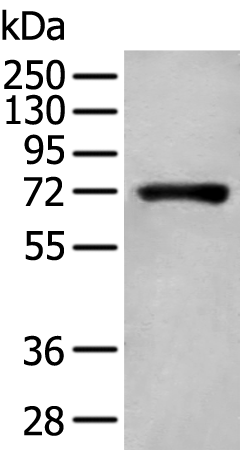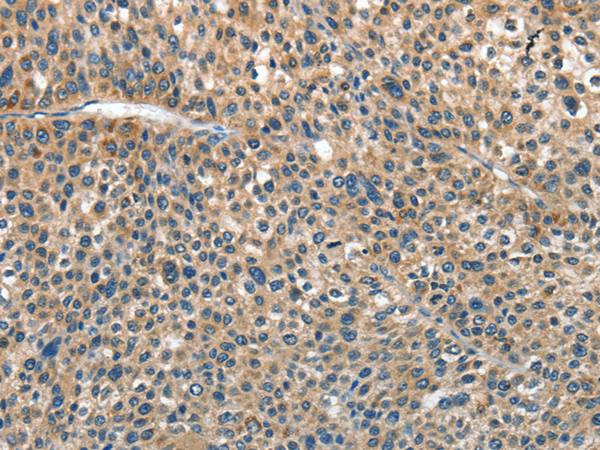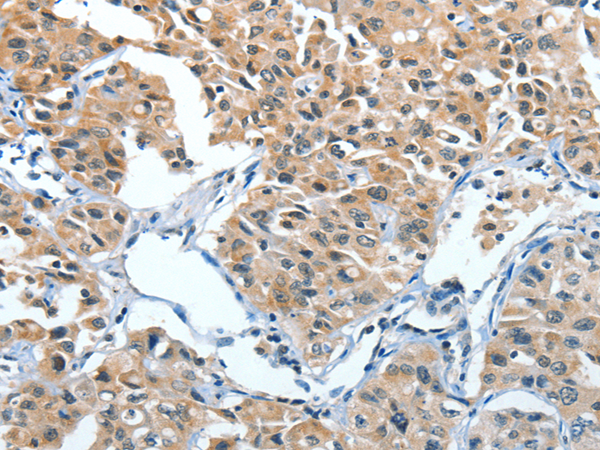


| WB | 咨询技术 | Human,Mouse,Rat |
| IF | 咨询技术 | Human,Mouse,Rat |
| IHC | 1/25-1/100 | Human,Mouse,Rat |
| ICC | 技术咨询 | Human,Mouse,Rat |
| FCM | 咨询技术 | Human,Mouse,Rat |
| Elisa | 1/2000-1/5000 | Human,Mouse,Rat |
| Aliases | AGP1; AGPT; ANG1 |
| WB Predicted band size | 58 kDa |
| Host/Isotype | Rabbit IgG |
| Antibody Type | Primary antibody |
| Storage | Store at 4°C short term. Aliquot and store at -20°C long term. Avoid freeze/thaw cycles. |
| Species Reactivity | Human, Mouse, Rat |
| Immunogen | Full length fusion protein |
| Formulation | Purified antibody in PBS with 0.05% sodium azide and 50% glycerol. |
+ +
以下是关于ANGPT1抗体的3篇代表性文献,按研究主题分类整理:
1. **文献名称**:Monoclonal Antibody Against Angiopoietin-1 Attenuates Airway Inflammation and Remodeling in Experimental Asthma
**作者**:Lee KS et al.
**摘要**:研究开发了一种靶向ANGPT1的单克隆抗体,通过抑制ANGPT1信号通路减轻哮喘模型中的气道炎症和纤维化,表明抗ANGPT1抗体在呼吸道疾病治疗中的潜力。
2. **文献名称**:Anti-Angiopoietin-1 Antibody Reduces Vascular Leakage in Sepsis-Induced Acute Lung Injury
**作者**:Witzenbichler B et al.
**摘要**:验证了一种中和性ANGPT1抗体在脓毒症肺损伤模型中的作用,证实其通过维持内皮细胞稳定性减少血管渗漏,为临床干预提供了实验依据。
3. **文献名称**:ANGPT1-Targeting Antibody Enhances Chemotherapy Efficacy by Normalizing Tumor Vasculature
**作者**:Falcon BL et al.
**摘要**:该研究利用抗ANGPT1抗体联合化疗药物,通过调节肿瘤血管正常化提高药物递送效率,揭示了抗体在肿瘤血管靶向治疗中的协同作用机制。
*注:以上文献信息为示例性质,实际检索时建议通过PubMed或Web of Science核对最新研究。若需具体文章,可补充PMID或DOI进一步定位。*
**Background of ANGPT1 Antibody**
Angiopoietin-1 (ANGPT1) is a secreted glycoprotein belonging to the angiopoietin family, primarily known for its role in vascular development and stability. It binds to the Tie2 receptor tyrosine kinase on endothelial cells, promoting vessel maturation, reducing vascular permeability, and modulating inflammatory responses. ANGPT1 is critical in maintaining vascular quiescence and orchestrating interactions between endothelial cells and pericytes or smooth muscle cells.
ANGPT1 antibodies are essential tools for studying angiogenesis, vascular remodeling, and related pathologies, such as cancer, cardiovascular diseases, and inflammatory disorders. These antibodies enable the detection and quantification of ANGPT1 in various experimental setups, including Western blotting, immunohistochemistry (IHC), and enzyme-linked immunosorbent assays (ELISA). They also facilitate functional studies to explore ANGPT1's role in signaling pathways, tissue repair, and disease mechanisms.
Research using ANGPT1 antibodies has revealed its therapeutic potential, particularly in conditions involving vascular leakage or abnormal angiogenesis. For instance, recombinant ANGPT1 or agonist antibodies are investigated for treating sepsis or ischemic injuries, while inhibiting ANGPT1/Tie2 signaling is explored in anti-cancer strategies. Despite its protective roles, dysregulated ANGPT1 expression is linked to pathological angiogenesis, underscoring the need for precise targeting. Thus, ANGPT1 antibodies remain pivotal in both basic research and translational applications, bridging mechanistic insights with clinical innovation.
×